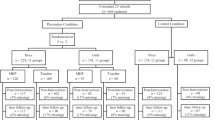Abstract
Aim
To prevent the development and increase of depressive symptoms in adolescents by empowering adolescents to improve their life skills, to foster their realistic thinking, and to influence school behaviour.
Subjects and methods
Vocational track students in grade 8 from the southwest of Germany participated either in a school-based universal prevention programme or a non-intervention control group (standard curriculum). The cognitive-behavioural programme LARS&LISA includes 10 sessions held in a regular school setting in same-gender groups. The programme is based on the social information-processing model of social competence (Dodge, Annual Review of Psychology 44:559-584, 1993) and consists of five basic elements: (1) formulation and setting of personal goals; (2) relationship between cognitions, emotions and behaviour; (3) exploration and change of dysfunctional cognitions; (4) training of social competence; (5) assertiveness training.
Results
The programme is extensively evaluated in three studies and has shown positive effects on the participants’ social network, symptoms of depression and aggressive behaviour compared to teaching as usual.
Conclusions
We have demonstrated that the programme can be successfully delivered to students in a higher vocational track of school (Realschule) by psychologists. Currently it is being evaluated in a lower vocational track of school (Hauptschule) by teachers and psychologists. With LARS&LISA we provide a prevention strategy that can be successfully delivered to a school-based population and integrated into classroom curriculum.



Similar content being viewed by others
References
Barrett PM, Lowry-Webster H, Turner C (2000) Friends Program for Children: participants workbook. Australian Academic, Brisbane, Australia
Bell DJ, Luebbe AM, Swenson LP, Allwood MA (2009) The children’s evaluation of everyday social encounters questionnaire: comprehensive assessment of children’s social information processing and its relation to internalizing problems. J Clin Child Adolesc Psychol 38(5):705–720
Bettge S, Wille N, Barkmann C, Schulte-Markwort M, Ravens-Sieberer U (2008) Depressive symptoms of children and adolescents in a German representative sample: results of the Bella study. Eur Child Adolesc Psychiatry 17(1):71–81
Birmaher B, Ryan N, Williamson D, Brent D, Kaufman J, Dahl R, Perel J, Nelson B (1996) Childhood and adolescent depression: a review of the past 10 years, part 1. J Am Acad Child Adolesc Psychiatry 35(11):1427–1439
Bos W, Voss A, Lankes E-M, Schwippert K, Thiel O, Valtin R (2004) Schullaufbahnempfehlungen von Lehrkräften für Kinder am Ende der vierten Jahrgangsstufe. In: Bos W, Lankes E-M, Prenzel M, Schwippert K, Valtin R, Walther G (eds) Iglu. Einige Länder der Bundesrepublik Deutschland im Vergleich. Waxmann, Münster, Germany, pp 191–228
Dodge KA (1993) Social-cognitive mechanisms in the development of conduct disorder and depression. Annu Rev Psychol 44:559–584
Fend H, Schröer S (1990) Depressive Verstimmungen in der Adoleszenz. Verbreitungsgrad und Determinanten in einer Normalpopulation. In: Steinhausen H-C, Albrecht HT (eds) Das Jugendalter: Entwicklungen, Probleme, Hilfen. Huber, Bern, Switzerland, pp 58–86
Georgiades K, Lewinsohn PM, Monroe SM, Seeley JR (2006) Major depressive disorder in adolescence: the role of subthreshold symptoms. J Am Acad Child Adolesc Psychiatry 45(8):936–944
Goodman E, Slap GB, Huang B (2003) The public health impact of socioeconomic status on adolescent depression and obesity. Am J Public Health 93(11):1844–1850. doi:10.2105/ajph.93.11.1844
Groen G, Pössel P, Al-Wiswasi S, Petermann F (2003) Universelle, schulbasierte Prävention der Depression im Jugendalter: Ergebnisse einer Follow-Up-Studie. Kindheit Entwicklung 12(3):164–174
Junge J, Neumer S-P, Manz R, Margraf J (2002) Gesundheit und Optimismus: GO! Trainingsprogramm für Jugendliche. Beltz, Weinheim, Germany
Merry S, McDowell H, Wild CJ, Bir J, Cunliffe R (2004) A randomized placebo-controlled trial of a school-based depression prevention program. J Am Acad Child Adolesc Psychiatry 43(5):538–547
Offord DR (2000) Selection levels of prevention. Addict Behav 25(6):833–842
Pössel P, Horn AB, Hautzinger M (2003) Erste Ergebnisse eines Programms zur schulbasierten Prävention von depressiven Symptomen bei Jugendlichen. Zeitschr Gesundheitspsychol 11(1):10–20
Pössel P, Horn AB, Groen G, Hautzinger M (2004a) School-based prevention of depressive symptoms in adolescents: a 6-month follow-up. J Am Acad Child Adolesc Psychiatry 43(8):1003–1010
Pössel P, Horn AB, Seemann S, Hautzinger M (2004b) Trainingsprogramm zur Prävention von Depressionen bei Jugendlichen. LARS&LISA. Lust an realistischer Sicht & Leichtigkeit im sozialen Alltag. Hogrefe, Göttingen, Germany
Pössel P, Baldus C, Horn AB, Groen G, Hautzinger M (2005) Influence of general self-efficacy on the effects of a school-based universal primary prevention program of depressive symptoms in adolescents: a randomized and controlled follow-up study. J Child Psychol Psychiatry 46(9):982–994
Pössel P, Horn AB, Hautzinger M (2006a) Vergleich zweier schulbasierter Programme zur Prävention depressiver Symptome bei Jugendlichen. Z Klin Psychol Psychother 35(2):109–116
Pössel P, Seemann S, Ahrens S, Hautzinger M (2006b) Testing the causal mediation component of Dodge’s social information processing model of social competence and depression. J Youth Adolesc 35:849–859
Pössel P, Seemann S, Hautzinger M (2008) Impact of comorbidity in prevention of adolescent depressive symptoms. J Couns Psychol 55(1):106–117
Shochet IM, Dadds MR, Holland D, Whitefield K, Harnett PH, Osgarby SM (2001) The efficacy of a universal school-based program to prevent adolescent depression. J Clin Child Psychol 30(3):303–315
Spence SH, Sheffield JK, Donovan CL (2003) Preventing adolescent depression: an evaluation of the problem solving for life program. J Consult Clin Psychol 71(1):3–13
Spoth R, Goldberg C, Redmond C (1999) Engaging families in longitudinal preventive intervention research: discrete-time survival analysis of socioeconomic and social-emotional risk factors. J Consult Clin Psychol 67(1):157–163. doi:10.1037/0022-006x.67.1.157
Sukhnandan L, Lee B, Kelleher S (2000) An investigation into gender differences and achievement: phase 2, School and classroom strategies. National Foundation for Educational Research, Slough, UK
Warrington M, Younger M (2003) ’we decided to give it a twirl’: single-sex teaching in English comprehensive schools. Gend Educ 15(4):339–350
World Health Organization (2004) Prevention of mental disorders: effective interventions and policy options. WHO, New York
Acknowledgments
Research supported by German Research Foundation (DFG) and Federal Ministry of Education and Research (BMBF).
Conflict of interests
The authors declare that they have no conflict of interest.
Author information
Authors and Affiliations
Corresponding author
Rights and permissions
About this article
Cite this article
Wahl, M.S., Patak, M.A., Pössel, P. et al. A school-based universal programme to prevent depression and to build up life skills. J Public Health 19, 349–356 (2011). https://doi.org/10.1007/s10389-011-0400-z
Received:
Accepted:
Published:
Issue Date:
DOI: https://doi.org/10.1007/s10389-011-0400-z




